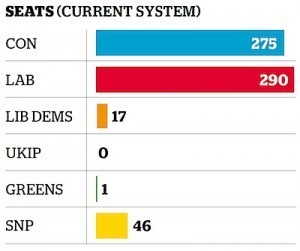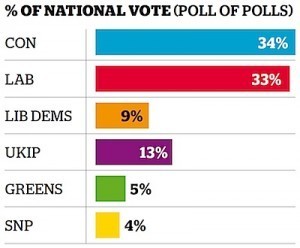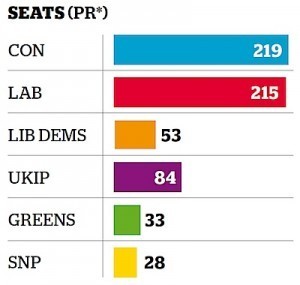Time for Proportional Representation: Whatever the Outcome of the General Election, Our Voting System is Unfair and Unrepresentative
 On the eve of Britain’s General Election, I wanted to make sure that I expressed my hope that anyone who can will vote to keep the Tories out — for the reasons I have been pointing out since they came to power in 2010: their disdain for the poor, the ill, the unemployed and the disabled; their unparalleled obsession with destroying the state provision of services; and their dedication to enriching the already rich, all carried out under a false claim that we need savage austerity, a false claim that has repeatedly been exposed by competent economists as an ideologically-driven madness that is enormously damaging to the economy.
On the eve of Britain’s General Election, I wanted to make sure that I expressed my hope that anyone who can will vote to keep the Tories out — for the reasons I have been pointing out since they came to power in 2010: their disdain for the poor, the ill, the unemployed and the disabled; their unparalleled obsession with destroying the state provision of services; and their dedication to enriching the already rich, all carried out under a false claim that we need savage austerity, a false claim that has repeatedly been exposed by competent economists as an ideologically-driven madness that is enormously damaging to the economy.
My archive of articles about the Tories’ crimes since May 2010 (225 articles to date) is here, under the unambiguous heading, “Battle for Britain: Fighting the Coalition Government’s Vile Ideology,” and if you still have any doubts about my position, please listen to “Tory Bullshit Blues,” the free song I recently made available on Soundcloud, by my band The Four Fathers.
The worst outcome after the election would be for the Tories to be back in power with the support of the Liberal Democrats, who will be given a kicking at the polls for their support of the Tories for the last five years, but who will limp on electorally. I can’t even bear to think about the Tories continuing to be in charge of the country, to be honest, but if it does happen I can only hope that ordinary people will — eventually — rise up in disgust and will not continue to embrace their oppressors as though punishment is something they deserve (a legacy of Puritanism and the class system), or in the futile hope — largely, it seems, successfully imported from the US in recent decades — that they too may one day be rich, when, of course, given the current fashion for rich people to be as greedy as possible, they would not want to pay any of their wealth in tax to ensure the smooth running of society as a whole.
The best result, given the current electoral system, would be for Labour to be able to form a government with the support of the SNP (Scottish National Party), although that, too, is not without its problems. Although the SNP would obviously provide a much needed push to the left — having demonstrated during last year’s referendum on independence that socialism can be discussed openly in Scotland — their raison d’être is to leave the union, something that for myself, from a northern English working class background, is more a betrayal of our shared heritage, oppressed by rich southerners, than a declaration of freedom.
And the Labour Party, of course, continues, in many ways, to be the weird schizophrenic monster it has been since New Labour transformed it 20 years ago — a friend of the same dark forces embraced by the Tories (and the Lib Dems), but one that is, however, constantly being pulled to the left by those who remember its higher calling — to stand for the people against the oppressors. That said, I believe the Labour Party can be argued with, fought against and negotiated with in a way that the Tories cannot. Like true psychopaths and sociopaths (and, indeed, like Tony Blair and Margaret Thatcher), they are not for turning, they are never for turning, and attacking them, or even arguing with them, only makes them more fanatically determined to do whatever it is that those opposing them dislike.
 Despite all of my comments above, however, the biggest problem in this election is the electoral system itself, with its ludicrous, anachronistic “first past the post” voting system, which consigns the majority of votes to the electoral dustbin. I don’t think it was ever justifiable as a fair system, and recall how unjust it was in the 1970s, when I grew up in a Liberal household. In February 1974, for example, when Labour won with 11,645,616 votes and 301 seats (29.3% of those eligible to vote), the Liberals, who got 6,059,519 votes, secured just 14 seats — something that, on my 11th birthday (which was when the election took place), I was able to work out was an appallingly unjust state of affairs. To spell it out, what it meant was that, for Labour, 38,690 votes were required for each seat, while the Liberals had to get a staggering 432,822 votes for each of their seats.
Despite all of my comments above, however, the biggest problem in this election is the electoral system itself, with its ludicrous, anachronistic “first past the post” voting system, which consigns the majority of votes to the electoral dustbin. I don’t think it was ever justifiable as a fair system, and recall how unjust it was in the 1970s, when I grew up in a Liberal household. In February 1974, for example, when Labour won with 11,645,616 votes and 301 seats (29.3% of those eligible to vote), the Liberals, who got 6,059,519 votes, secured just 14 seats — something that, on my 11th birthday (which was when the election took place), I was able to work out was an appallingly unjust state of affairs. To spell it out, what it meant was that, for Labour, 38,690 votes were required for each seat, while the Liberals had to get a staggering 432,822 votes for each of their seats.
In February 1974, 78.8% of registered voters turned out to vote, and over 70% of voters continued to turn out at elections until 2001, when just 59.4% of those eligible to vote bothered to visit a polling station. In 2005 and 2010, those figures rose — but not to 20th century levels. 61.4% turned out in 2005, and 65.1% in 2010 — a demonstration, if any were needed, of an ongoing disengagement with the political establishment.
In addition, a breakdown of the votes reveals how the unjust distribution of votes has continued. In 2005, when the Labour Party won its third election in a row, 9,552,436 people voted for Labour, which was 35.2% of the votes cast, but just 21.6% of the total population eligible to vote. Labour had 355 seats, meaning that 26,908 votes were required for each seat. The Liberal Democrats, meanwhile, received 5,985,454 votes but only secured 62 seats, meaning that 96,540 votes were required for each seat, an improvement on 1974, but still grossly unfair, although this was nothing compared to the unfairness faced by UKIP and the Greens, who secured no seats at all, even though UKIP got 605,973 votes and the Greens got 257,758 votes.
In 2010, 10,703,654 people voted for the Tories, which was 36.1% of the votes cast, but just 23.5% of the total population eligible to vote. The Tories had 306 seats, meaning that 34,979 votes were required for each seat. The Liberal Democrats, meanwhile, received 6,836,248 votes but only secured 57 seats, meaning that 119,934 votes were required for each seat. The Greens, meanwhile, secured one seat with 265,243 votes while UKIP, which received 919,471 votes, got no seats.
So is there any chance of changing this unfair situation? When political power used to bounce between Labour and Conservative, who were able to form governments without resorting to coalitions, it was obvious that neither party would call for electoral reform. Now, however, it looks like coalitions are the new norm, and with falling voter numbers for the Tories and Labour, and ever increasing voter numbers for other parties, it is difficult to see how resistance to a fairer system can continue forever.
Based on the voting figures from 2010, when 27,148,510 people voted in 650 seats, a genuinely representative proportional representation system would mean that 41,766 votes for any party would secure the election of an MP. For this to work, constituencies would have to be slightly larger, but there is no reason to think that this would severely dilute constituency representation, and the outcome would be both fairer, and much more likely to encourage voter participation. When your vote actually does count — rather than only counting if you live in a marginal seat — there’s far less justification for people to say that there’s no point in voting.
 Yesterday, the Independent addressed electoral reform, on its front page, in an article entitled, “Sixty per cent of people want voting reform, says survey.” Actually, the figure was 61%, from a poll conducted by ORB, who spoke to over 2,000 people between May 1 and 3, finding that the majority “believe the system should be reformed so that smaller parties are better represented in parliament, while 39 per cent think it should remain as it is.”
Yesterday, the Independent addressed electoral reform, on its front page, in an article entitled, “Sixty per cent of people want voting reform, says survey.” Actually, the figure was 61%, from a poll conducted by ORB, who spoke to over 2,000 people between May 1 and 3, finding that the majority “believe the system should be reformed so that smaller parties are better represented in parliament, while 39 per cent think it should remain as it is.”
Four years ago, a watered-down PR system was put to a referendum, as a Lib Dem condition of entering into a coalition with the Tories, which was vigorously opposed by the Tories and by Labour. On a low turnout (just 42.2%), those who took part voted by 68% to 32% against a switch to the “alternative vote” system — which, it should be noted, is not true proportional representation.
The graphs alongside this article, which accompanied the Independent‘s article yesterday, show the percentage of votes for each party based on the latest estimates, the results under the current system, and under a system of proportional representation, and while I find it alarming to consider that UKIP would have 84 MPs as a result, I will defend that because of its fairness — a fairness that would also, of course, see the Greens get the seats they deserve.
As the Independent noted yesterday, “Reform is endorsed by all social class groups and in every region of Great Britain,” and Vince Cable, the Lib Dem business secretary, was clear about why change is needed. “There must be a debate,” he said, adding, “The system is breaking down and producing particularly absurd outcomes.” He also pointed out that the SNP look set to dominate Scotland with “barely majority, and possibly minority support.”
Cable also explained, “First-past-the-post was designed for a two-party system. We have long since passed that point. The next step is for people in the two biggest parties to say ‘enough is enough’. The problem is that they are vested interests standing in the way. I would hope they realise we are getting into dangerous political waters — parties with very limited legitimacy trying to form governments.”
It is time for change — but first of all, to put it bluntly, we have to get rid of the Tories, to allow room for notions of fairness and social justice to breathe once more. Please vote wisely tomorrow!
 Andy Worthington is a freelance investigative journalist, activist, author, photographer, film-maker and singer-songwriter (the lead singer and main songwriter for the London-based band The Four Fathers). He is the co-founder of the “Close Guantánamo” campaign, the co-director of “We Stand With Shaker,” calling for the immediate release from Guantánamo of Shaker Aamer, the last British resident in the prison, and the author of The Guantánamo Files: The Stories of the 774 Detainees in America’s Illegal Prison (published by Pluto Press, distributed by the University of Chicago Press in the US, and available from Amazon, including a Kindle edition — click on the following for the US and the UK) and of two other books: Stonehenge: Celebration and Subversion and The Battle of the Beanfield. He is also the co-director (with Polly Nash) of the documentary film, “Outside the Law: Stories from Guantánamo” (available on DVD here — or here for the US).
Andy Worthington is a freelance investigative journalist, activist, author, photographer, film-maker and singer-songwriter (the lead singer and main songwriter for the London-based band The Four Fathers). He is the co-founder of the “Close Guantánamo” campaign, the co-director of “We Stand With Shaker,” calling for the immediate release from Guantánamo of Shaker Aamer, the last British resident in the prison, and the author of The Guantánamo Files: The Stories of the 774 Detainees in America’s Illegal Prison (published by Pluto Press, distributed by the University of Chicago Press in the US, and available from Amazon, including a Kindle edition — click on the following for the US and the UK) and of two other books: Stonehenge: Celebration and Subversion and The Battle of the Beanfield. He is also the co-director (with Polly Nash) of the documentary film, “Outside the Law: Stories from Guantánamo” (available on DVD here — or here for the US).
To receive new articles in your inbox, please subscribe to Andy’s RSS feed — and he can also be found on Facebook (and here), Twitter, Flickr and YouTube. Also see the six-part definitive Guantánamo prisoner list, and “The Complete Guantánamo Files,” an ongoing, 70-part, million-word series drawing on files released by WikiLeaks in April 2011. Also see the definitive Guantánamo habeas list, the full military commissions list, and the chronological list of all Andy’s articles.
Please also consider joining the “Close Guantánamo” campaign, and, if you appreciate Andy’s work, feel free to make a donation.
Andy Worthington's Blog
- Andy Worthington's profile
- 3 followers



